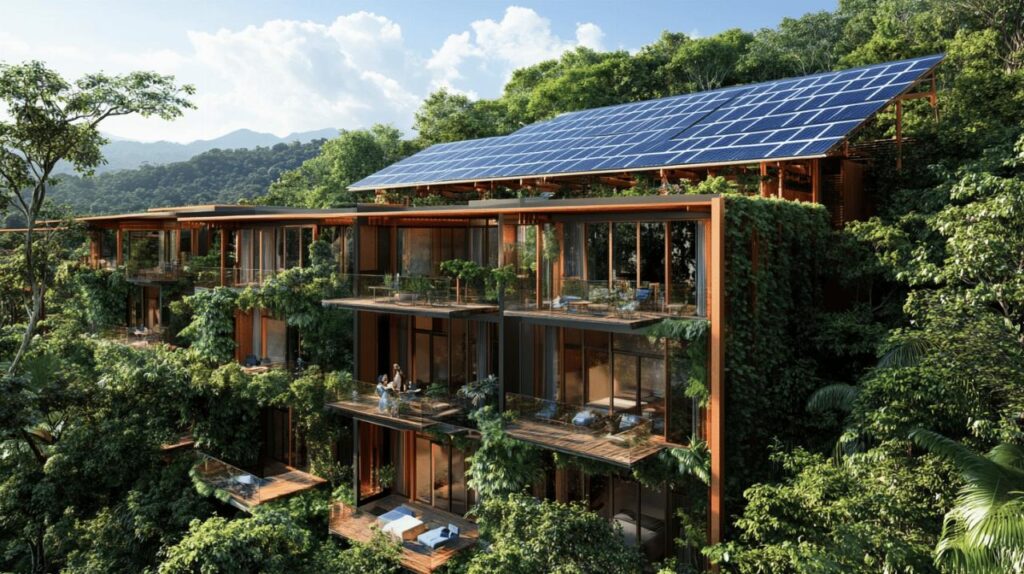In the dynamic landscape of hospitality, creating an effective environmental policy has become essential for hotels looking to reduce their ecological impact while meeting the growing demand for sustainable accommodation options. As more travellers prioritise eco-friendly stays, hotels are recognising that comprehensive green strategies not only benefit the planet but also enhance their brand reputation and bottom line. This article explores why developing a robust environmental policy is crucial for hotels embarking on a sustainability journey and how to implement one successfully.
Understanding Environmental Policies in the Hotel Industry
A well-crafted environmental policy serves as the foundation for any hotel’s sustainability efforts. To create hotel environmental policy effectively, establishments must first understand what constitutes a comprehensive framework. Such a policy outlines a hotel’s commitment to environmental stewardship, specific sustainability goals, and the strategies to achieve them. It encompasses everything from energy and water management to waste reduction, sustainable procurement, and guest engagement initiatives. According to recent industry guidelines, effective policies should align with recognised standards such as ISO 14001 or Green Key certifications, providing structure and credibility to sustainability efforts.
What constitutes a comprehensive environmental policy
A thorough environmental policy addresses multiple operational aspects within a hotel. It should outline clear objectives for each department, ensuring all areas from housekeeping to food and beverage contribute to sustainability goals. Recent guidelines emphasise that policies must include measurable targets, designated responsibilities, implementation timelines, and monitoring procedures. The most effective policies also incorporate Environmental, Social, and Governance (ESG) principles, reflecting a holistic approach to sustainability that considers not only ecological impact but also social responsibility and ethical management practices.
The role of environmental policies in sustainable hospitality
Environmental policies function as strategic roadmaps that guide hotels toward more sustainable operations. They establish accountability and provide a framework for continuous improvement in ecological performance. With the hospitality industry contributing approximately 2% of the 5% global CO2 emissions from tourism, these policies are crucial for sector-wide climate action. Furthermore, they help hotels respond to market demands, as studies indicate that 79% of travellers now prioritise eco-friendly accommodations when making travel decisions. Beyond meeting consumer expectations, robust policies also enable hotels to contribute meaningfully to broader Sustainable Development Goals related to clean water, responsible consumption, and climate action.
Developing a Roadmap for Environmental Objectives
Creating an effective environmental policy begins with a comprehensive audit of current operations to identify key impact areas. This assessment provides baseline measurements against which future progress can be evaluated. Hotels should examine energy consumption patterns, water usage, waste production, procurement practices, and transportation needs. With this data, establishments can then set specific, measurable, achievable, relevant, and time-bound objectives that address their most significant environmental challenges.
Setting achievable green targets for your hotel
Realistic goal-setting forms the backbone of any successful environmental policy. Hotels should establish both short-term and long-term targets that progressively reduce their ecological footprint. For instance, industry guidelines suggest aiming to reduce electricity use in guest rooms by 25% by 2027 through the implementation of motion-sensor lighting and energy-efficient systems. Similarly, establishments might target an 80% waste diversion rate in food and beverage operations within three years. These objectives should be ambitious enough to drive meaningful change yet attainable enough to maintain staff motivation and engagement. Importantly, goals should be reviewed and adjusted periodically to reflect changing technologies, regulations, and operational realities.
Implementing monitoring systems to track environmental progress
Effective environmental policies require robust monitoring mechanisms to track performance and identify areas for improvement. Hotels should establish key performance indicators (KPIs) for each environmental objective and implement systems to collect and analyse relevant data. Modern property management systems often include sustainability modules that can track resource consumption, waste generation, and associated costs. Regular audits, conducted either internally or by third-party assessors, provide opportunities to verify data accuracy and assess policy compliance. The most successful hotels make this information transparent, sharing progress reports with staff and guests to foster accountability and celebrate achievements.
Reducing your hotel’s ecological footprint
Once a solid policy framework is established, hotels must focus on implementing practical measures to reduce their environmental impact. These initiatives typically centre around energy efficiency, water conservation, and waste management strategies that can be integrated into daily operations. Successful implementation requires not only technological solutions but also behavioural changes among staff and guests.
Strategies for efficient energy consumption management
Energy management represents one of the most significant opportunities for hotels to reduce both environmental impact and operational costs. Leading hotels are investing in energy-efficient lighting, with LED bulbs using up to 80% less energy than traditional alternatives. Smart room management systems that automatically adjust heating, cooling, and lighting based on occupancy can dramatically reduce wastage. One notable example comes from priority sources, which mention a hotel that invested £50,000 in boiler room upgrades, resulting in a 30% reduction in CO2 emissions. Renewable energy adoption, though currently the least implemented practice according to research on Egyptian Green Star hotels, offers tremendous potential for further reducing carbon footprints. Hotels might consider on-site solar installations, renewable energy certificates, or power purchase agreements to transition away from fossil fuels.
Effective waste reduction and water conservation practices
Water conservation and waste management form essential components of any hotel environmental policy. Hotels typically use between 100 and 200 gallons of freshwater per occupied room daily, presenting substantial opportunity for conservation. Installing low-flow fixtures in bathrooms can significantly reduce consumption without impacting guest comfort. Some hotels have implemented intelligent water management systems that detect leaks and optimise irrigation. Regarding waste, policies should emphasise the principle of reduce, reuse, and recycle. Transitioning from single-use plastic toiletries to refillable dispensers can eliminate up to 1,000 plastic bottles monthly. Food waste composting programmes can divert significant organic material from landfills, with one hotel reportedly composting 200kg monthly with plans to reach 500kg. Working with specialised recycling partners ensures that materials are properly sorted and processed, with some properties achieving zero waste to landfill status.
Attracting eco-conscious guests through green initiatives
 Beyond operational improvements, environmental policies should address how sustainability efforts are communicated to potential guests. With 72% of travellers expressing desire to make sustainable choices, effectively marketing green initiatives can provide a competitive advantage. Hotels must balance transparency about their environmental achievements with avoiding exaggerated claims that might be perceived as greenwashing.
Beyond operational improvements, environmental policies should address how sustainability efforts are communicated to potential guests. With 72% of travellers expressing desire to make sustainable choices, effectively marketing green initiatives can provide a competitive advantage. Hotels must balance transparency about their environmental achievements with avoiding exaggerated claims that might be perceived as greenwashing.
Marketing your environmental commitments to potential guests
Hotels should integrate sustainability messaging throughout their marketing channels, highlighting specific environmental initiatives and achievements. Websites might feature dedicated sustainability pages that detail policy commitments and progress toward goals. Social media platforms provide opportunities to showcase green practices in action, from behind-the-scenes glimpses of recycling operations to chef-led tours of rooftop gardens. Many properties now include environmental certifications in their online listings, understanding that 76% of travellers are more likely to book accommodations with green credentials. When communicating sustainability efforts, specific examples and measurable outcomes tend to resonate more strongly with guests than general statements about environmental concern.
Building guest loyalty through shared environmental values
Environmental policies should include strategies for engaging guests in sustainability efforts during their stay. Properties might offer incentives for participating in linen reuse programmes, which can save approximately 50 litres of water per stay. Digital information about conservation initiatives can replace printed materials in rooms. Some hotels have developed guest rewards programmes that recognise participation in green activities or offer carbon offset options for stays. Research indicates that 43% of travellers would pay more for environmentally responsible accommodations, suggesting that well-executed sustainability programmes can command premium pricing while building loyalty among eco-conscious consumers. By creating opportunities for guests to align their values with their travel choices, hotels can foster deeper connections that encourage repeat visits and positive recommendations.
Financial benefits of going green
While environmental policies are primarily designed to reduce ecological impact, they also deliver significant financial advantages. Understanding these economic benefits can help secure executive support and necessary investment for sustainability initiatives. According to industry research, hotels with strong executive backing for green programmes experience three times higher staff participation rates, accelerating implementation and results.
Cost reductions through resource efficiency measures
Environmental policies that prioritise resource efficiency typically generate substantial operational savings. Energy conservation measures can significantly reduce utility costs, which represent a major expense category for most properties. Water-saving fixtures reduce both water bills and the energy required for heating. Waste reduction initiatives lower disposal fees and may even generate revenue through recycling programmes. According to priority sources, eco-friendly practices can reduce operational costs by up to 20%, with specific savings of 0.5-2 euros per night possible through various initiatives. These immediate savings help offset the initial investment in green technologies and practices, improving short-term financial performance while supporting environmental goals.
Long-term investment returns from sustainable practices
Beyond immediate cost savings, environmental policies can enhance long-term financial performance through multiple mechanisms. Properties with strong sustainability credentials often experience increased occupancy rates and higher average daily rates from eco-conscious travellers willing to pay premiums for responsible accommodations. Green initiatives frequently improve staff satisfaction and retention, with Green Key-certified hotels reporting 40% higher staff retention rates. This reduction in turnover translates to lower recruitment and training costs. Additionally, properties with forward-thinking environmental policies may benefit from reduced exposure to future regulatory compliance costs as environmental regulations become increasingly stringent. When evaluating potential sustainability investments, hotels should consider these broader, long-term financial benefits alongside immediate resource savings.
Maintaining relevance through policy reviews
Environmental policies should not be static documents but rather evolving frameworks that adapt to changing circumstances. Regular reviews ensure that sustainability efforts remain effective, efficient, and aligned with both hotel objectives and broader environmental priorities. Without systematic assessment, even well-designed policies can become outdated or disconnected from operational realities.
Establishing regular assessment protocols for your environmental policy
Hotels should develop structured approaches to evaluating policy effectiveness on a scheduled basis. This typically involves comparing performance metrics against established targets, identifying gaps, and investigating root causes of underperformance. Staff feedback should be systematically collected to understand implementation challenges and improvement opportunities. Assessments might include departmental self-evaluations followed by cross-functional reviews to ensure consistency. Many properties benefit from establishing green committees with representatives from different operational areas to oversee assessment processes. The frequency of comprehensive reviews might vary based on hotel size and complexity, but annual evaluations represent a common industry practice, with more frequent monitoring of specific metrics throughout the year.
Adapting to emerging environmental trends and technologies
The final component of a robust environmental policy involves processes for incorporating new developments into sustainability strategies. Environmental management is a rapidly evolving field, with new technologies, best practices, and scientific understanding constantly emerging. Hotels should designate responsibility for monitoring industry innovations and regulatory changes that might affect their environmental programmes. Partnerships with industry associations, certification bodies, and environmental organisations can provide valuable intelligence about emerging trends. Staff training represents another critical element, with leading hotels targeting substantial investment in environmental education. One example from priority sources mentions a target of 30,000 training hours over three years, with 30% of staff already following environmental standards since implementation. By maintaining awareness of developments and fostering a culture of continuous improvement, hotels can ensure their environmental policies remain relevant and effective in a changing world.





